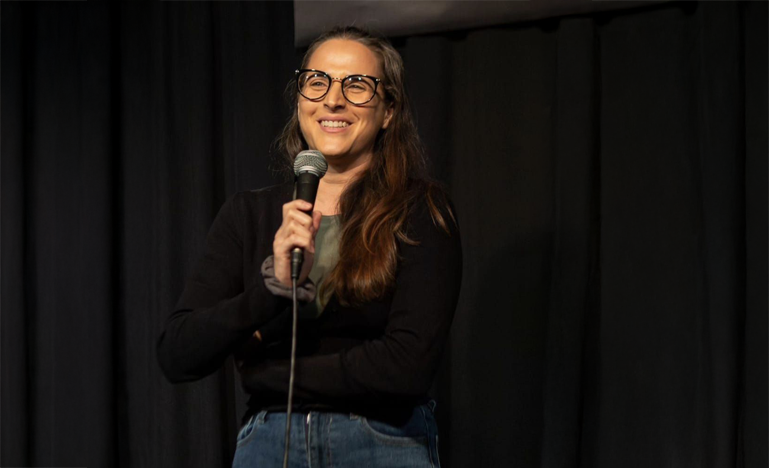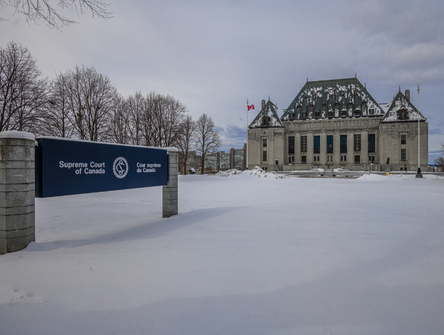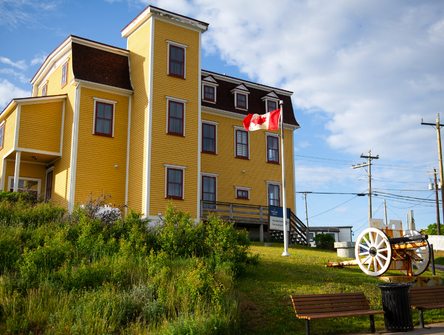Lawyers looking for laughs
It turns out there are more parallels between a comedy club and a courtroom than you might think

Have you heard the one about the comedian lawyer?
Well, it’s not actually a joke. It turns out they do exist.
For Nadia Halum, her foray into stand-up comedy began after being asked about her hobbies while waiting in line at a Cirque du Soleil show, only to realize she didn’t have any.
“I didn't think listening to true crime podcasts while cleaning my apartment sounded very exciting,” she says.
“So, I kind of decided I needed to start carving out time for myself to do what I want.”
She had a background in theatre but didn’t like the time commitment, so stand-up comedy seemed like a good fit.
“If I don't make it out to an open mic, I'm just disappointing myself, not a whole company of people.”
Litigator Michael Currie’s foray into comedy began as a student in New Brunswick. He started attending open mics after reading that it could help his public speaking skills. When he eventually moved to Ottawa, he discovered the larger comedy scene gave him more opportunities to hone his writing and performance skills.
“I don't think a lot of people appreciate this when they're going to a comedy show, of how much practice and rewriting of your material is required,” he says.
“There are people who go out and will just wing it, or they're good at improv, and then they'll do a set. But if you really want to refine your jokes, it requires a lot of reflecting, writing, rewriting, going out, recording your sets, listening to those, and refining as you see what works with the crowd.”
While the parallels between comedy and court may not be obvious at first glance, Currie says being on stage is not unlike making submissions.
“You need to know the record in and out.”
When doing a cross-examination of a witness, you have to understand where they are coming from and adapt your questioning based on their answers. Similarly, comedians have to get a sense of where their audience may be coming from to help guide their set.
“Both of them are human processes,” he says.
For Halum, telling jokes on an open mic stage helps prepare her for the unexpected in the courtroom because it strengthens her ability to “roll with the punches” and feel confident in her words.
“I have jokes that 90 per cent of the time do well, and then the 10 per cent that they don’t. Sometimes I can be a little taken aback, like ‘how come that didn't work?’ But you can't dwell on it too much, you have to improvise or comment about how it didn't work and keep going.”
She says knowing how to “read the room” is as important in a courtroom as it is on stage.
“Sometimes a judge's face can say a lot."
Despite the parallels, Currie says stand-up was a chance to pursue something separate from law.
“One of the benefits of doing stand-up is that you have to force yourself to get out of the office, or get out of your working-from-home, to do it,” he says.
“The thrill of being able to go out and do stand-up is a great motivator to keep going out.”
He doesn’t talk about being a lawyer in his normal sets, but says comedy is creatively fulfilling and gives him space to consider issues from different angles.
Halum practices labour and employment law in Toronto and sometimes mentions her day job while on stage. More than once that’s elicited interesting conversations with audience members after shows.
“Sometimes I do have people come up to me after the show saying, ‘I have an issue with my boss,’” she laughs.
She finds the writing and creating humour helps her balance life as a lawyer.
“It can be a really cathartic process, especially if I have something that's bothering me, that's on my mind, to be able to transform that into something that makes me laugh, and hopefully make other people laugh.”
In the latest episode of Modern Law: Verdicts and Voices, host Alison Crawford talks to Currie and Halum about taking their courtroom skills to comedy clubs. She also chats with Ottawa lawyer Thomas Slade, who parlayed his passion for the law and the Constitution into a fun, competitive pastime.
Inspired by his experience in a hockey pool, he created Fantasy Courts, where Supreme Court of Canada enthusiasts guess the outcomes and breakdowns of judgments. The league works the same way most fantasy sports leagues work.
“Any time the Supreme Court announces that it's going to be releasing a decision, we put the decision on the website about a week beforehand, and then players can go on and make predictions on how they think each judge will rule on that decision,” Slade says.
Whoever gets the most predictions right in a row is the winner.
Half of Slade’s practice is appellate law, while the other half is Supreme Court of Canada agency work. With so much of his professional life focused on what’s happening at the country’s top court, he was keen to find a lighter side to the work.
“I like the whole idea of gamifying what the Supreme Court is doing.”
While it started as a fun way to keep track of what was happening, Slade’s pool has been making predictions for nearly seven years.
“At first, I thought it was just going to be practicing lawyers, but we have a pretty big group of law students … and quite a few staff at law firms who are interested in what the courts are putting out.”
Some retired lawyers are also among the Fantasy Courts ranks, as it helps keep them looped in on legal developments.
“This sort of gives them a little nudge and a reason to follow along.”
Tune in to the podcast to hear about which upcoming Supreme Court decision Slade thinks will get a lot of attention in his fantasy league. Also in this episode, an interview with Canadian historian Constance Backhouse on her 2022 book, Reckoning with Racism: Police, Judges, and the RDS Case, about the first time the Supreme Court of Canada considered a complaint of judicial racial bias, and a newsy chat about the Safe Third Country Agreement.


